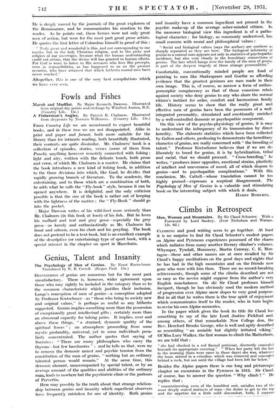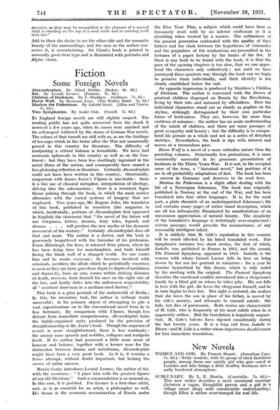Climbs in Retrospect
CLIMBING and good writing seem to go together. At least it is no surprise to find Sir Claud Schuster's modest papers on Alpine and Pyrenean experiences possessed of the charm
which radiates from many another literary climber's volumes. Whymper, Tyndall, Mummery, Martin Conway, C. E. Mon- tague—these and other names are at once recalled by Sir Claud's happy meditations on the good days and nights that he has had in the high mountains and on the friends now gone who were with him then. There are no record-breaking achievements, though some of the climbs described are not so easy as the novice might suppose from the author's very English nonchalance. On ski Sir Claud professes himself inexpert, though he has obviously used the modern method of progression over Alpine snow slopes to very good purpose. But in all that he writes there is the true spirit of enjoyment which communicates itself to the reader, who in turn begins to revise his own Alpine memories.
In the paper which gives the book its title Sir Claud has something to say of the late Lord Justice Pickford and, among others, of that remarkable New College don, the Rev. Hereford Brooke George, who is well and aptly described as resembling an amiable but slightly irritated viking."
Of Miss Lucy Walker, the first woman to climb the Matterhorn, we are told that :
" she had climbed in a rod flannel petticoat, discreetly concealed beneath its appropriate covering." When her party left the but in the morning (huts were rarer in those days) she was, whatever the hour, attired in a crinoline, which was removed and concealed behind a rock, but not until the village had been left far below."
Besides the Alpine papers there is one long and picturesque chapter on excursions in" the Pyrenees in 1913. Sir Claud, of course, has to answer the question " Why climb ? " He replies that : ,
mountaineering, even of the humblest sort, satisfies two of the most deeply seated instincts of man—the desire to get to the top and the appetite -for. A little mild discomfort, both, I suPpose
atavistic, as they may be exemplified in the pleasure of a normal child in standing on the top of a sand castle and in covering itself with dirt."
Add to these the desire to see the other side and the romantic beauty of the surroundings, and the case as the author con- ceives it, is overwhelming. Sir Claud's book is printed in unusually good clear type and is illustrated with portraits and Alpine views.







































 Previous page
Previous page